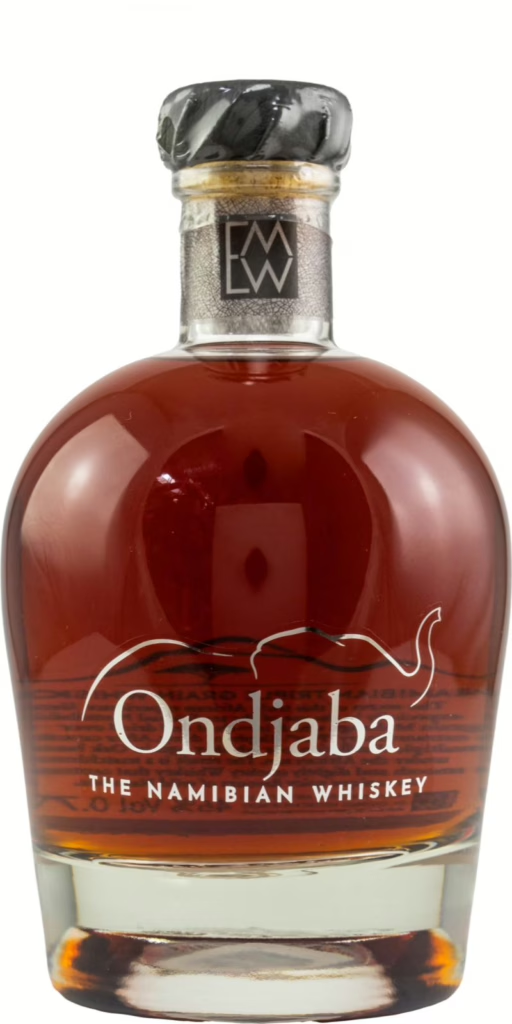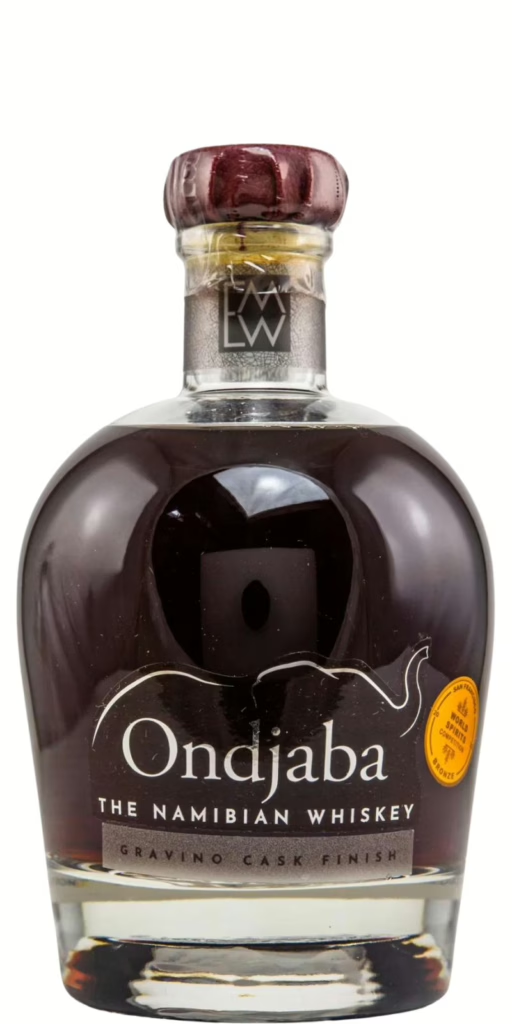Today brings a true whisky first: the chance to explore not one, but two Namibian whiskies – my first ever drams from this country, and both hailing from Ondjaba. These are not just ordinary new experiences, either. What makes these expressions quite so remarkable – or perhaps notorious – is the use of an ingredient that is well and truly out of the ordinary: local cereals smoked over burning elephant dung in place of the peat one finds in Scotland, for instance. That one detail alone ensures that Ondjaba promises to stand out, whether or not for the right reasons. Such a bold use of regional tradition could yield something either genuinely special or simply unforgettable in ways less anticipated. One thing is certain: the tasting of these two Ondjaba Namibian whiskies might not be easily forgotten.
Erongo Mountain Winery
Ondjaba is Namibia’s pioneering whisky, made by the Erongo Mountain Winery located at over 1,200 metres above sea level. Its name derives from the Ovambo word for ’elephant’, a nod to one of its most distinctive production elements: instead of traditional peat, the distillery uses burning elephant dung to smoke the malt. This unique method imparts a characteristic smoky aroma and a sweet, cigar-like flavour that distinguishes Ondjaba from other whiskies. The Erongo Mountain Winery started making whisky back in 2014.
The whisky showcases a rare combination of locally sourced grains, including maize, barley, wheat, rye, and mahangu (pearl millet), a staple cereal crop in northern Namibia. These grains undergo traditional malting and smoking processes before the spirit undergoes multiple distillations. Maturation takes place under the intense African sun in a range of cask types, including virgin oak, ex-bourbon, and the distillery’s own fortified wine barrels, allowing for accelerated ageing and flavour development.
Ondjaba embraces its African heritage throughout its production philosophy, rejecting attempts to imitate Scotch or Irish whisky styles. And with elephant dung used to smoke the malt, reminiscing about what Floki does in Iceland with sheep dung, we can expect them to really differentiate from Scotch or Irish whisky.
African Whisky
If Ondjaba is the only Namibian whisky, it’s not the only whisky coming from the African continent. Despite its size, however, Africa hosts only a few whisky distilleries:
James Sedgwick Distillery (South Africa) – Owner of the iconic Three Ships single malt and Bain’s single grain brands, the largest commercial whisky distillery on the continent. I really ought to review whiskies from this distillery, as I should still have a couple of bottles at home.
Qualito Craft Distillery (South Africa) – Makers of Limpopo Reserve Whisky, made using corn as its base grain. The whisky matures in South African red wine oak barrels.
Helden Distillery (South Africa) – Known for their African Bonfire whisky expressions featuring smoky profiles with African influences. It is made using indigenous malted red sorghum alongside malted South African barley.
Eastern Distillers (Nigeria) – Producer of Elegamon whisky, one of the few Nigerian-produced whiskies on the market. Their website doesn’t even mention what it is made from, so I cannot be sure it would qualify as whisky in Europe or the USA.
National Alcohol & Liquor Company (Ethiopia) – Maker of Black Deer Whisky, among the emerging whisky brands in Ethiopia. I couldn’t find much information, and their website was down when I wrote this article.
There may be other whisky distilleries on the African continent, but there were the ones I could find at the time of writing.
Ondjaba Classic The Namibian Whisky (2021) Review
Ondjaba Classic is a Namibian single grain whisky that matured in a combination of virgin oak and red wine barriques, and is bottled at 46% ABV without added colour. Kirsch Import distributes Ondjaba Classic across Europe, with the widest availability in Germany and the Netherlands. Bottles typically retail from around €65 in Germany, slightly higher in the Netherlands.

Colour:
Burnt umber.
Nose:
Neat: After recalling the infamous Flóki Sheep Dung, this nose comes as a pleasant relief – no trace of dung here. Sandalwood and gentle spice lead the way, with a rye-like sharpness underneath. Lime zest, orange pulp, and a soft campfire smoke follow, creating balance and intrigue. Resting in the glass brings out dark fruits and creamy custard, giving a lovely transition from earthy to sweet.
Palate:
Neat: Virgin oak and red wine casks assert their presence, adding noticeable wood and a hint of tannins, yet they stay just within balance. Red fruits and a touch of tartness reveal the wine’s influence, while spices such as cinnamon, tobacco, and hazelnut enrich the mid-palate. Tangerines and lemon notes add brightness, rounded off by mild smoke that gives the impression of gentle peat. The texture feels a bit thin, though not detracting.
Finish:
Spices linger warmly, with pepper, clove, and cinnamon leading alongside pickled ginger and a faint chocolate note. Sandalwood and cedar return softly in the aftertaste. The spice gives a slight prickle on the tongue, and the finish is long.
Comments:
What a pleasant surprise and a clear reminder not to judge before tasting. I expected something as dreadful as the Flóki Sheep Dung whisky – and I was completely wrong. This Ondjaba may not achieve perfection, and I usually avoid whiskies matured in active wood, like virgin oak or red wine casks, yet it proves genuinely good and skilfully made. It stands confidently on its own, without attempting to mimic Scotch whisky, and succeeds as a distinct creation rooted in its Namibian identity.
Rating: 6.5/10
Ondjaba Gravino Cask Finish (2021) Review
Gravino is a port-style fortified liqueur wine produced at Erongo Mountain Winery in Namibia. The Ondjaba Gravino Cask Finish takes the distillery’s Namibian triple grain whisky – made from local grains including mahangu (pearl millet) smoked over elephant dung – and finishes it in casks previously used for Gravino wine. Bottled at 46% ABV without chill filtration or added colouring, it showcases fruity, spicy, and smoky notes, enhanced by the warm, dry Namibian climate that accelerates maturation. This is available mainly through German and Dutch retailers, with prices typically around €70 in Germany and close to €90 in the Netherlands.

Colour:
Between mahogany and burnt umber.
Nose:
Neat: The nose opens with gentle smoke and vinous undertones. Raspberries and blackcurrants mingle with a tangy acidity reminiscent of underripe grapes. Initial intensity feels lower than the regular Ondjaba and requires time to develop. Allowing the whisky to breathe brings forth more ashy, dry smoke and a hint of incense. The nose could nearly pass for a sherry-matured whisky, with notes of exotic wood adding another layer.
Palate:
Neat: Smoked cherries and pronounced red wine character dominate the palate. Vinous flavours, red fruits, and tannins create a lively contrast with spices like pepper, cloves, and cinnamon. Citrusy brightness from tangerine and lemon meets European wood spices and a raspy texture. The dram presents a flavour profile akin to spiked cherry and grape juice. While not perfectly balanced, the palate remains enjoyable and even a touch playful.
Finish:
Soot and eucalyptus arrive first, followed by fresh dark cherries and a dusting of pepper. The finish lingers, retaining its spicy edge for a notably long duration.
Comments:
This was an entertaining dram, far, on paper, from the whiskies I usually favour. While it may not align perfectly with traditional whisky expectations, its spirited character and adventurous profile show that sometimes a whisky’s charm lies exactly in its daring and distinctiveness. For those seeking something out of the ordinary and packed with personality, Ondjaba hits the mark and offers a fun, flavourful journey worth exploring. This is bold, unique, packed full of flavour, and sometimes, that’s just what the doctor orders.